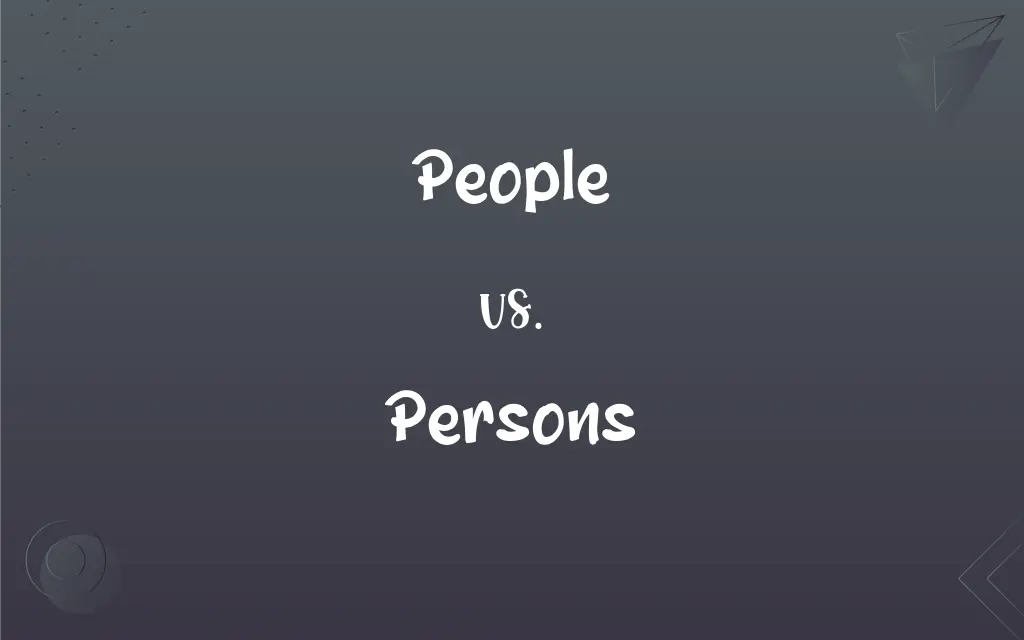People vs. Persons: What's the Difference?
Edited by Aimie Carlson || By Harlon Moss || Updated on October 25, 2023
"People" is the plural form of "person" for general use, while "persons" is a more formal version often used in legal and official contexts.

Key Differences
The words "people" and "persons" both denote more than one individual. However, they are used differently in various contexts. "People" is the more common and informal plural form of "person" and is typically used in everyday speech and writing. When one speaks of groups or crowds, the term "people" often comes to mind. On the other hand, "persons" carries a more formal tone, used primarily in official documents, laws, or certain formal situations.
The usage distinction between "people" and "persons" can be traced back to language conventions and guidelines. For instance, many style guides suggest using "persons" when referring to a specific, countable number of individuals. "Ten persons were injured in the accident," one might hear in a news report. However, in more general terms or when an exact count isn't emphasized, "people" is the preferred term.
Historically, "persons" was the predominant form used in literature and official documents for many centuries. But over time, as language evolved and adapted to societal changes, "people" became the more prevalent and accepted term in common usage. Still, in legal contexts, where precision is essential, "persons" remains the preferred choice.
To understand the nuances between "people" and "persons," one can look at their usage in sentences. For example, "The room can accommodate 20 persons," has a formal tone, while "People love to gather at the park," conveys a more general and casual message. Recognizing these subtleties can help in choosing the right term for the right situation.
Comparison Chart
Common Usage
Informal and general contexts.
Formal, legal, and official situations.
ADVERTISEMENT
Countability
Typically used for uncounted or large groups.
Often used for specific, countable numbers.
Historical Prevalence
Became more popular in recent times.
Predominant in older literature and documents.
Tone
Casual.
Formal.
Example
"People are talking about the new movie."
"Four persons are required to complete the task."
People and Persons Definitions
People
The public or community.
The news surprised many people.
ADVERTISEMENT
Persons
Individuals being referred to formally.
The document is addressed to the concerned persons.
People
Inhabitants of a particular area.
The indigenous people have lived here for centuries.
Persons
Individuals in a specific category.
Only authorized persons may enter.
People
Humans considered collectively.
The people of the town gathered for the annual festival.
Persons
Specific number of individuals.
The elevator has a limit of 8 persons.
People
Members of a family or tribe.
Her people have always lived in the mountains.
Persons
Inhabitants in an official capacity.
All persons residing in this district must register.
People
Persons forming a group.
A group of people stood by the entrance.
Persons
More than one human being in a legal context.
Persons found trespassing will be prosecuted.
People
Humans considered as a group or in indefinite numbers. Often treated as a plural of person, alone and in compounds
People were dancing in the street. I met all sorts of people. This book is not intended for laypeople.
Persons
A living human. Often used in combination
Chairperson.
Salesperson. See Usage Note at chairman.
FAQs
Is "people" more informal than "persons"?
Yes, "people" is more informal and commonly used, while "persons" has a formal tone.
Why do legal documents often use "persons"?
Legal contexts prioritize precision, making the specific and formal "persons" more suitable.
When should I use "persons" over "people"?
Use "persons" in formal, legal, or official contexts or when referring to a specific countable number.
Is "people" the only plural form of "person"?
No, both "people" and "persons" are plural forms, but "people" is more common.
Does the word "peoples" have a different meaning?
Yes, "peoples" can refer to distinct ethnic or cultural groups, e.g., "the peoples of Africa."
Can "people" refer to a nation's inhabitants?
Yes, e.g., "The American people voted in the election."
Is "persons" becoming obsolete?
While less common in everyday speech, "persons" is still relevant in legal and formal contexts.
Are there idiomatic expressions involving "people" or "persons"?
Yes, e.g., "people person" (someone sociable) but idioms with "persons" are rarer.
How do I decide which term to use?
Consider your audience, the context, and the tone you want to convey, then choose the term that fits best.
Can "persons" and "people" be used interchangeably?
While similar, they are best used in their respective contexts; "people" for general use, "persons" for formal situations.
How has the usage of "people" and "persons" evolved over time?
Historically, "persons" was more prevalent, but "people" has become the dominant form in modern usage.
How do dictionaries define "people" vs. "persons"?
Dictionaries often list "people" as the common plural of "person," with "persons" noted for formal contexts.
Which term should I use in academic writing?
Both can be used, but context matters. If being specific or formal, "persons" may be better.
How do native speakers generally view the use of "persons"?
Many might find "persons" formal or old-fashioned, preferring "people" in everyday speech.
Are there cases where using "persons" is grammatically wrong?
Not necessarily, but it might sound awkward or overly formal in casual settings.
Can I use "people" in a legal document?
It depends on the jurisdiction and context, but "persons" is typically preferred for clarity and precision.
Do style guides have a stance on this topic?
Many style guides provide guidelines, often suggesting "people" for general use and "persons" for specific counts or formal writing.
Why do some official guidelines suggest "persons" for specific numbers?
It emphasizes precision and clarity in situations where the exact number of individuals matters.
In journalism, which term is preferred?
"People" is commonly used, but "persons" might appear in formal reports or specific contexts.
How do other languages differentiate these terms?
Many languages have distinct words or forms, but the nuances can vary.
About Author
Written by
Harlon MossHarlon is a seasoned quality moderator and accomplished content writer for Difference Wiki. An alumnus of the prestigious University of California, he earned his degree in Computer Science. Leveraging his academic background, Harlon brings a meticulous and informed perspective to his work, ensuring content accuracy and excellence.
Edited by
Aimie CarlsonAimie Carlson, holding a master's degree in English literature, is a fervent English language enthusiast. She lends her writing talents to Difference Wiki, a prominent website that specializes in comparisons, offering readers insightful analyses that both captivate and inform.
































































